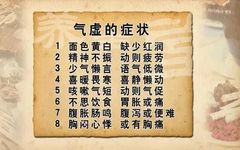
Aunt Li, in her sixties, has been retired for many years. Many people envy Aunt Li’s retirement life, thinking it must be easy to finally retire and do what she wants, such as singing, dancing, traveling, and meeting friends. However, Aunt Li prefers to stay at home, does not like to socialize, and does not cook; her husband does all the cooking. Many people admire Aunt Li’s retirement life, but little do they know that she has a slightly overweight physique, gets tired easily when doing chores, has shortness of breath, and experiences spontaneous sweating. Although Aunt Li lives on the third floor, she usually takes the elevator because climbing stairs leaves her breathless, requiring her to rest for a while before continuing to climb. In addition, Aunt Li feels her eyelids are swollen every morning, and when she presses on her ankles at night, there are small pits. People like Aunt Li represent a typical Qi deficiency constitution.
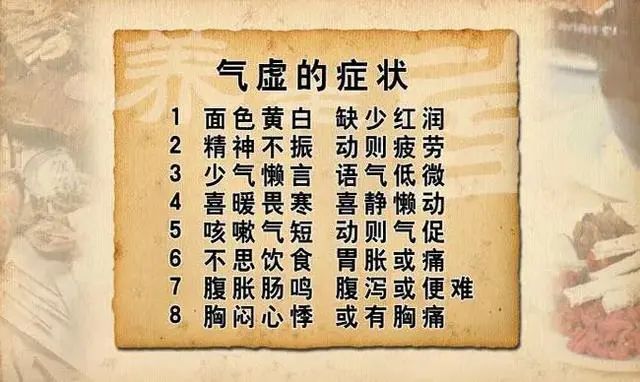
Individuals with a Qi deficiency constitution are prone to recurrent colds, chronic fatigue syndrome, obesity, weight loss, diarrhea, habitual constipation, organ prolapse, chloasma, allergic rhinitis, pediatric respiratory infections, chronic obstructive pulmonary disease, hypertension, coronary heart disease, and other conditions.
 How to Identify Qi Deficiency Constitution
How to Identify Qi Deficiency Constitution
Qi is the fundamental energy that sustains life activities, similar to how a steam engine requires steam to operate. Individuals like Aunt Li, who have a Qi deficiency constitution, experience insufficient energy due to inadequate Qi propulsion, leading to symptoms such as chronic fatigue, shortness of breath, spontaneous sweating, edema, and obesity.
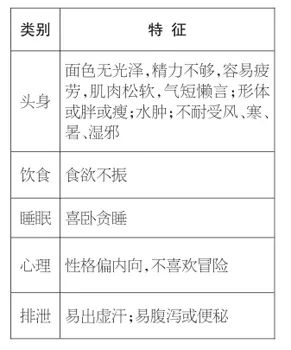
 Characteristics of Qi Deficiency Constitution
Characteristics of Qi Deficiency Constitution
Physical Appearance
Individuals with a Qi deficiency constitution often have a pale yellow complexion, lack of luster, insufficient energy, soft and weak muscles, shortness of breath, and may be either overweight or underweight, with signs of edema. Due to prolonged Qi deficiency, their energy levels are insufficient, leading to fatigue; Qi deficiency cannot support normal bodily functions, resulting in a pale complexion and lack of vitality; muscles do not receive adequate Qi nourishment, leading to weakness and even a thin physique; exertion depletes Qi, causing shortness of breath with minimal activity, known as ‘deficiency asthma’; Qi deficiency disrupts normal fluid metabolism, leading to dampness and phlegm accumulation in the body, resulting in obesity and edema.
Individuals with a Qi deficiency constitution have poor adaptability to external environmental changes and cannot tolerate wind, cold, heat, or dampness. This is because those with Qi deficiency cannot protect their exterior, leading to decreased resistance to external pathogens. Clinically, seasonal colds are often due to Qi deficiency, which makes it difficult to withstand seasonal changes or climate variations.
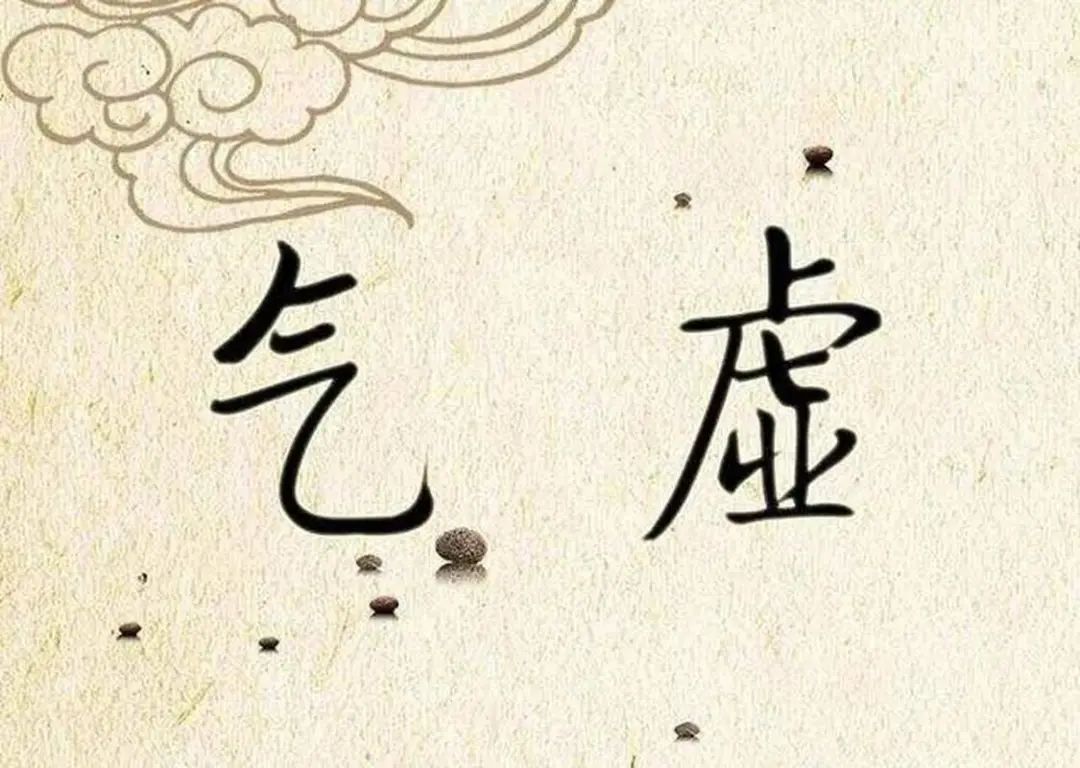
Moreover, individuals with a Qi deficiency constitution may not tolerate both cold and heat. I once knew an old man named Wang who could not withstand either cold or heat, especially disliking summer. In summer, when the sun blazed, he found it hard to endure the heat, and if he spent too long outdoors, he would easily suffer from heatstroke. Indoors, the air conditioning was too cold, making him reluctant to go out during summer. However, he needed to go to the market every day to buy groceries, where the air conditioning was strong. After shopping, he had to leave immediately, as staying longer would make him feel very uncomfortable due to the cold.
Dietary Considerations
There is a woman who often feels fatigued and lacks appetite at mealtimes, eating very little. Individuals with a Qi deficiency constitution generally have weak digestive functions, leading to poor appetite.
Sleep
A young man in his thirties named Wang is in the prime of his career but does not like to move and always feels fatigued, often wanting to lie down. He speaks with a lack of energy. Those with a Qi deficiency constitution have insufficient energy, making them prone to fatigue and a desire to sleep. However, despite this, he still feels tired. The “Huangdi Neijing” states: “Prolonged lying down harms Qi.” Even though they are easily fatigued and want to sleep, they should choose suitable forms of exercise to avoid further depleting their Qi.
Psychological Aspects
We often find that some people around us have introverted personalities, prefer quietness, and do not like to take risks. One female classmate is like this; she does not like to talk to others, avoids crowded places, and even sleeps with cotton balls in her ears. She only engages in activities when she feels confident. Individuals with a Qi deficiency constitution have low energy levels and psychological activity, leading to introverted personalities and a preference for quietness over adventure.
Excretion
Master Zhang is a property maintenance worker who sweats and breathes slightly heavily when working. Upon further inquiry, I learned that he often suffers from diarrhea. This is because Qi deficiency cannot hold fluids, leading to excessive sweating. Individuals with a Qi deficiency constitution have low digestive and absorption capabilities, making them prone to diarrhea. Qi deficiency can also slow intestinal peristalsis, leading to habitual constipation. This type of constipation is not characterized by hard stools; rather, they may be dry at first and then soft, with a sense of urgency but difficulty in passing stools, often accompanied by sweating and shortness of breath, leading to fatigue after defecation.
 How to Regulate Qi Deficiency Constitution
How to Regulate Qi Deficiency Constitution
Individuals with Qi deficiency often have weak vitality, and the principle of body regulation is to cultivate and replenish vital Qi, tonifying Qi and strengthening the spleen.
Dietary Regulation
Those with a Qi deficiency constitution should choose foods that are neutral to slightly warm, tonifying the spleen and benefiting Qi, while avoiding or minimizing foods that deplete Qi, such as water spinach, areca nut, and raw radish. They should not consume excessive cold, bitter, spicy, or hot foods. Since individuals with Qi deficiency often have weak spleen and stomach, their diet should not be overly rich or greasy, as this can lead to stagnation in the spleen and stomach, causing bloating and poor appetite. Suitable animal foods include beef, chicken, eggs, and quail (eggs), while grains and legumes such as glutinous rice, yam, lotus seeds, white lentils, soybeans, and tofu are recommended. Fruits and vegetables like pumpkin, jujube, carrots, and shiitake mushrooms are also beneficial.

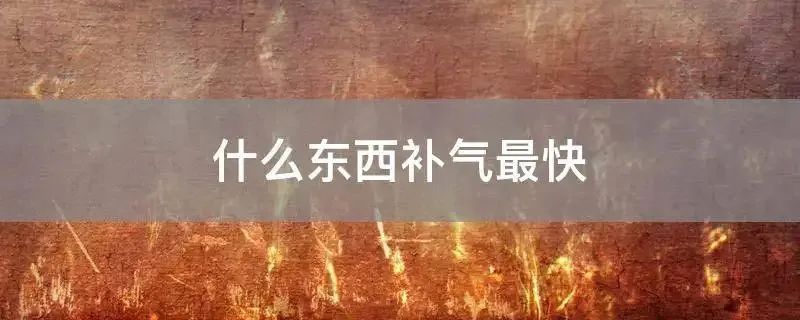
Beef is neutral in nature, sweet in flavor, and enters the spleen and stomach meridians. According to “Bencao Shiyi,” it “eliminates edema, removes dampness, replenishes deficiency, and strengthens muscles and bones.” “Han’s Medical Communication” states: “Yellow beef tonifies Qi, and has the same effect as Astragalus membranaceus.” Beef is effective in tonifying the spleen and stomach, benefiting Qi and blood, and strengthening muscles and bones, making it particularly suitable for those with a Qi deficiency constitution.
Chicken is warm in nature, sweet in flavor, and enters the spleen, stomach, and liver meridians. According to “Rihua Zi Bencao,” “Yellow hen: stops fatigue, replenishes marrow and essence, assists Yang Qi, warms the small intestine, stops seminal leakage, and tonifies water Qi. Black hen: calms the mind, treats blood stasis, expels residual blood and pus, tonifies heart blood, replenishes postpartum deficiency, and benefits complexion and Qi.” Its warm nature helps to assist Yang Qi and replenish essence, making it suitable for elderly individuals with Qi deficiency. It can also be used for those recovering from illness.
Yam is neutral in nature, sweet in flavor, and enters the lung, spleen, and kidney meridians. Yam has the effects of tonifying the spleen, nourishing the stomach, generating fluids, benefiting the lungs, and tonifying the kidneys. Dishes based on yam are suitable for those with a Qi deficiency constitution or those with concurrent Yin deficiency.
Pumpkin is warm in nature, sweet in flavor, and enters the spleen and stomach meridians. Pumpkin has the effects of tonifying the middle, benefiting Qi, strengthening the spleen, and warming the stomach, making it suitable for individuals with a Qi deficiency constitution.
Glutinous Rice is neutral in nature, sweet in flavor, and enters the lung meridian. According to “Bencao Gangmu,” among the five grains, “only this grain receives the Qi of heaven and earth, and has the power of creation and reproduction, thus incomparable to others.” Glutinous rice nourishes the five organs, tonifies the middle, benefits Qi, strengthens the spleen and stomach, nourishes Yin, generates fluids, and alleviates thirst, making it suitable for various constitutions, especially those with Qi deficiency. However, it is important to note that glutinous rice should not be refined; most commonly consumed rice is processed, destroying many coarse fibers, proteins, and vitamins. Therefore, it is advisable to consume unrefined brown rice in daily life.
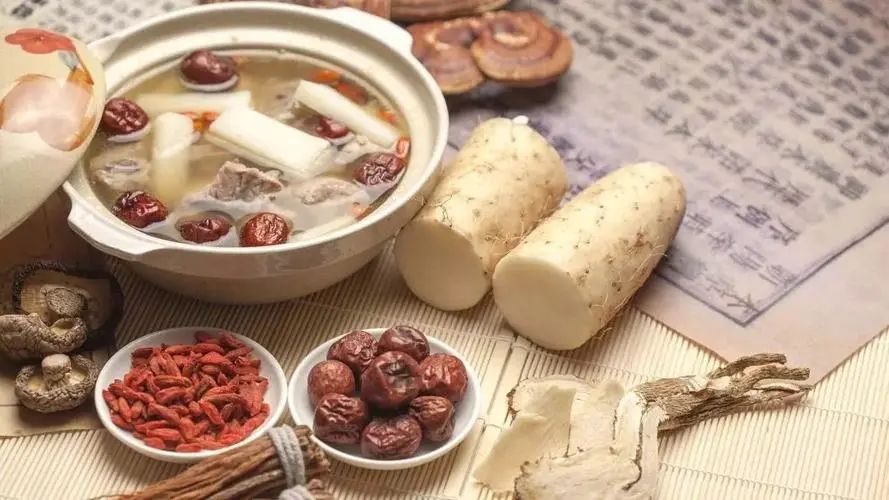
 Health-Promoting Recipes for Qi Deficiency Constitution
Health-Promoting Recipes for Qi Deficiency Constitution
Beef and Yam Soup
【Ingredients】250g beef, 30g yam, 15g lotus seeds, 10g fennel, 15g Poria cocos, 5 slices of ginger, 20g jujube.
【Preparation】Wash the beef and cut it into pieces. Wash the yam, lotus seeds, Poria, ginger, and jujube in clean water. Wrap the fennel in gauze, and place it in a pot with the beef and other ingredients. Add an appropriate amount of water and simmer on low heat until tender. Add a little salt; all ingredients except ginger and fennel can be consumed.

【Effects】Strengthens the spleen and stomach, benefits Qi, and regulates the body. Suitable for individuals with a Qi deficiency constitution to consume regularly.
Astragalus Chicken
【Ingredients】1 young chicken, 9g raw Astragalus (Huang Qi).
【Preparation】Wash the young chicken, wrap the raw Astragalus in a gauze bag, tie one end tightly, and place it in a pot. Add ginger, scallions, and an appropriate amount of water to make soup. Once the chicken is cooked, remove the Astragalus bag. Season with salt and cooking wine, and it is ready to eat.

【Effects】Benefits Qi and replenishes deficiency. Suitable for individuals with a Qi deficiency constitution who are prone to spontaneous sweating or recurrent colds to consume regularly.
Yam and Glutinous Rice Porridge
【Ingredients】30g yam, 180g glutinous rice.
【Preparation】Cook the yam and glutinous rice together in a pot with an appropriate amount of water until it becomes porridge. This porridge can be consumed during dinner.
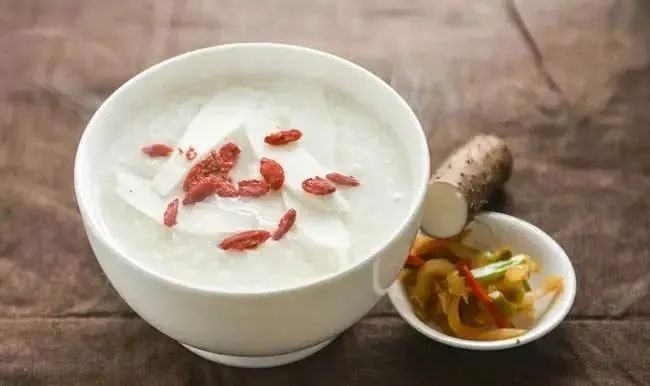
【Effects】Tonifies the middle, benefits Qi, nourishes the lungs, and strengthens the kidneys. Suitable for individuals with a Qi deficiency constitution, and can also be used for those with deficiencies in the lungs, spleen, or kidneys.
Astragalus and Codonopsis Steamed Chicken
【Ingredients】20g Astragalus, 20g Codonopsis, 1 hen, scallions, ginger, salt, cooking wine, MSG, and pepper water as needed.
【Preparation】1. After slaughtering the hen, remove the feathers and internal organs, and cut it into 3cm cubes. Blanch in boiling water for 3 minutes, then rinse off the blood foam and place in a steamer. Add scallions, ginger, salt, MSG, cooking wine, and pepper water. 2. Cut the Astragalus and Codonopsis into 4cm long pieces, wash them, and place them in the steamer. Cover and steam for 3 hours, then remove the ginger, scallions, and Astragalus.
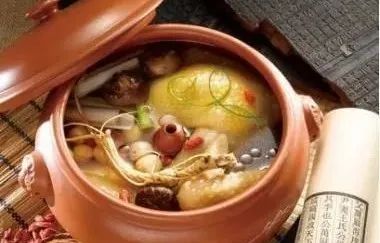
【Effects】Tonifies the middle, benefits Qi, and lifts the Yang. Suitable for individuals with a Qi deficiency constitution who have mild organ prolapse to consume regularly.
Pumpkin and Glutinous Rice Porridge
【Ingredients】50g pumpkin, 100g glutinous rice.
【Preparation】Cut the pumpkin into small pieces and cook it with glutinous rice to make porridge.
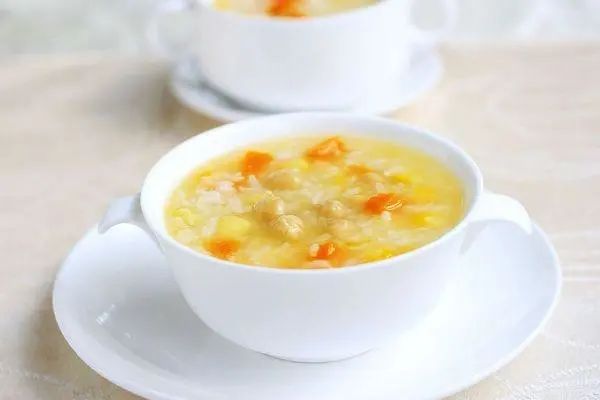
【Effects】Tonifies the middle, benefits Qi, and strengthens the spleen and warms the stomach. Suitable for individuals with a Qi deficiency constitution who are prone to fatigue and poor appetite.
 Physical Exercise
Physical Exercise
Exercise should be gentle and moderate. Individuals with a Qi deficiency constitution should engage in low-intensity, high-frequency exercise, gradually increasing the frequency while reducing the total load of each session. It is important to control the duration of exercise and progress gradually. High-load exercises and those that cause excessive sweating should be avoided, as well as strenuous movements that require prolonged breath-holding, to prevent depleting vital energy. Gentle traditional fitness activities, such as Ba Duan Jin (Eight Pieces of Brocade), are recommended. After completing the full set of Ba Duan Jin movements, add 1-3 repetitions of “Double Hands Climbing Feet to Strengthen the Kidneys” and “Clenching Fists and Glaring to Increase Strength.” Avoid vigorous exercise.
Additionally, the Kegel exercise can be used to prevent organ prolapse. The Kegel exercise involves relaxing the whole body and focusing attention on the perineal area. First, inhale and contract the abdomen, then squeeze and lift the anus, holding for 2-3 seconds before slowly relaxing and exhaling. Repeat this 10-15 times.
 Mental Regulation
Mental Regulation
Maintain an optimistic mindset. Individuals with a Qi deficiency constitution tend to be introverted and timid, avoiding risks. Therefore, it is essential to cultivate a broad-minded and optimistic attitude towards life, continuously encouraging oneself and enhancing self-confidence. Engaging in activities of interest, such as experiencing life in nature, documenting life journeys, pursuing beauty, expressing thoughts, and cultivating emotions, is beneficial. Listening to upbeat music, such as flute pieces like “Happy Reunion,” is also recommended.
 Daily Care
Daily Care
Avoid overexertion. It is important to balance work and rest, avoiding excessive labor to prevent damaging the vital energy. One should avoid sweating and exposure to wind. The living environment should be bright and warm in color.

Individuals with a Qi deficiency constitution cannot tolerate wind, cold, or hot climates. Therefore, their daily routines should be regular, with appropriate rest during hot summer afternoons and ensuring adequate sleep.
Those with a Qi deficiency constitution are prone to colds and have poor adaptability to temperature changes. They often spend long periods in air-conditioned or heated environments, increasing their likelihood of catching colds. Therefore, individuals with a Qi deficiency constitution should spend more time in natural climates. During the hot summer, they should take precautions and avoid excessive cooling, ensuring that indoor and outdoor temperatures do not differ too much. Vulnerable individuals, such as the elderly and children, should be cautious with cold showers.
 Acupuncture and Tuina
Acupuncture and Tuina
Selected Points: Qihai (Sea of Qi), Guanyuan (Origin Pass).
Simple Point Selection:
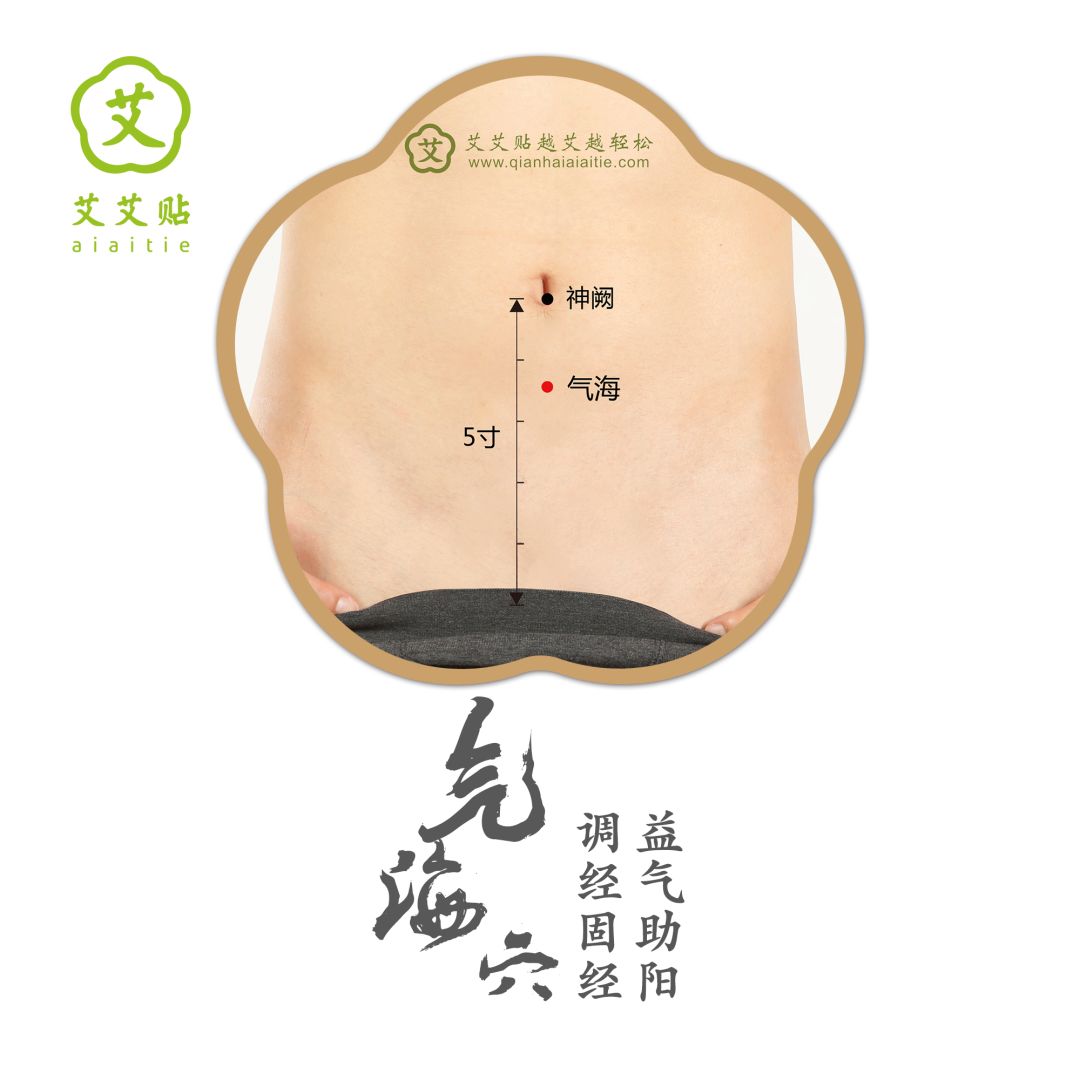
Qihai: When locating the point, one can lie on their back. Qihai is located in the lower abdomen, on the anterior midline. Draw a straight line from the navel to the pubic bone and divide this line into ten equal parts. The point is located at 3/10 of the distance from the navel downwards.
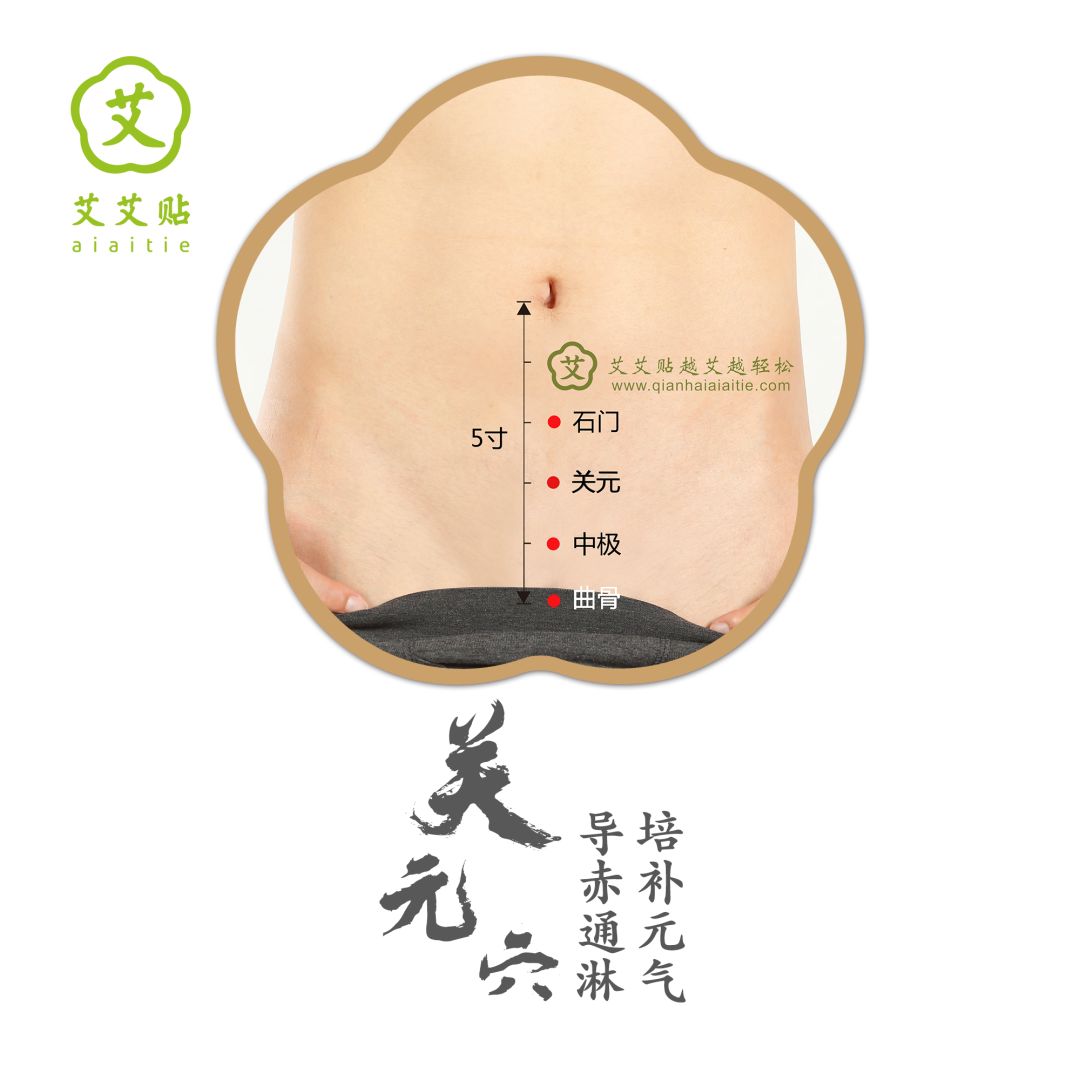
Guanyuan: When locating the point, one can lie on their back. Guanyuan is located in the lower abdomen, on the anterior midline. Draw a straight line from the navel to the pubic bone and divide this line into five equal parts. The point is located at 3/5 of the distance from the navel downwards.
Effects: Qihai has the effects of nourishing vital Qi, benefiting the kidneys, replenishing Yang, and promoting longevity. Guanyuan has the effects of nourishing the source and tonifying the lower burner.
Procedure: Use the palm to apply gentle pressure on the acupoints, performing soft circular motions for 2-3 minutes at each point, once or twice daily.
Additionally, moxibustion with moxa sticks can be used to enhance the warming and Qi-boosting effects. Ignite the moxa stick and apply it to the acupoints for 10 minutes each time. Gentle moxibustion can be performed once a week or on the days of seasonal transitions.
Source: Traditional Chinese Medicine Network, Authors: Ni Cheng, Xue Liyuan



Share the love of health preservation with friends.

